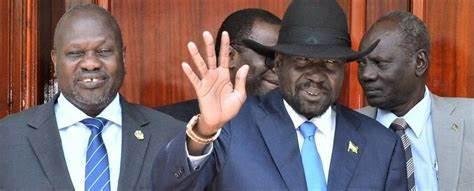Some members of civil society in South Sudan are blaming the Sudan People’s Liberation Movement (SPLM) under President Salva Kiir and the Sudan People’s Liberation Movement in Opposition (SPLM-IO) led by Dr. Riek Machar for the ongoing deadlock in the peace agreement.
The two are main parties to the 2018 peace agreement and misunderstanding among them is believed to have blocked the agreement from progressing.
Political parties that signed the Revitalized Agreement on the Resolution of the Conflict in the Republic of South Sudan (R-ARCSS) are facing scrutiny for their failure to effectively implement the 2018 peace deal.
With SPLM-IO leaders under house arrest, there have been confrontations between the South Sudan People’s DefenseForces (SSPDF) and the Sudan People’s Liberation in some parts of the country.
In response to the lack of progress in peace implementation, Edmund Yakani, the executive director for the Community Empowerment for Progress Organization (CEPO), an advocacy civil society organization, blames the parties for the delay in peace implementation.
“The major parties, the SPLM and SPLM-IO, continue with misunderstandings and the peace implementation delay,” he said.
He called on the parties to ensure teamwork and progress on the peace agreement.
On his part, Ter Manyang Gatwech, Executive Director, Centre for Peace and Advocacy (CPA), raised serious concerns about the ongoing incompetence in executing the peace accords.
“The Centre for Peace and Advocacy (CPA) expresses deep concern over the continued neglect of the implementation of the Revitalized Agreement on the Resolution of the Conflict in the Republic of South Sudan (R-ARCSS) by the parties involved,” he said.
Manyang expressed the lack of political commitment and will, adding that such action endangers South Sudan’s peace progress.
“The parties have not demonstrated the necessary commitment to fully implement the provisions of the agreement,” he said.
“The lack of genuine political will threatens the peace, stability, and development of our country,” he added.
The Reconstituted Joint Monitoring and Evaluation Commission (RJMEC), in its first-quarter report covering January to March 2025, noted that “In scenes not seen since the signing of the R-ARCSS over six years ago, armed conflict and violence erupted across the country, several high-ranking opposition members and parliamentarians were detained and imprisoned, and the First Vice President, Dr. Riek Machar Teny, was put under house arrest.”
Despite numerous reshuffles in ministerial and presidential positions, the peace monitors highlighted that key portfolios within some agreement institutions and mechanisms were left unattended.
